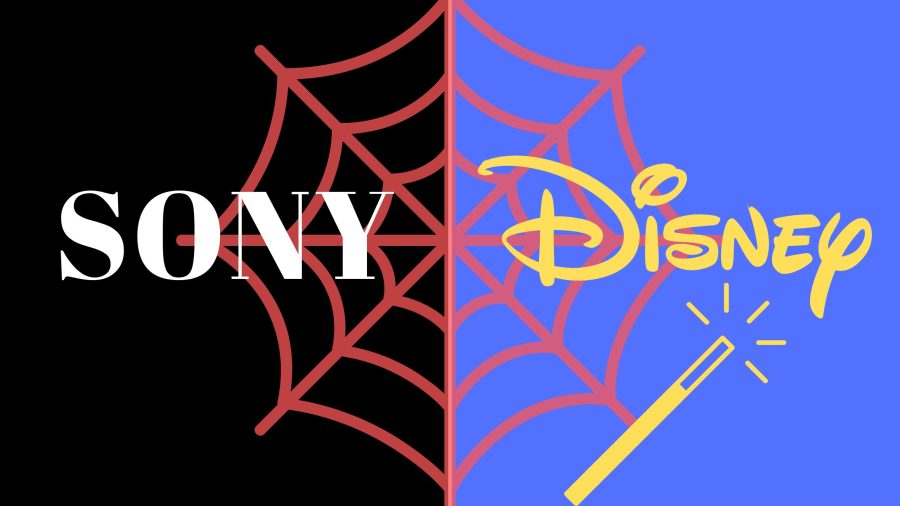Disney vs. Sony: Who is The Real Villain?
Oct 16, 2019
The summation of summer 2019 brought along with it heart-crushing news that sent Spidey lovers into a frenzy: Spider-Man would no longer be a part of the Marvel Cinematic Universe due to Sony and Disney failing to reach a financing agreement over this beloved character. Twitter exploded as the whole world tried to process this shocking news, some blaming Sony for the split and others directing their anger towards Disney. However, the vast majority of those who vocalized their opinions seemed to be in consensus that Sony was at fault, complaining that they allegedly ‘took Spider-Man’ away from Marvel and its fans. Although it was recently announced that Tom Holland’s titular role as the friendly neighborhood hero would stay in the Marvel cinematic universe, the discussion of which company was at fault for the contractual complications remains a topic of discussion, with many continuing to view Sony as the one at fault.
The issue with bandwagon hate upon Sony lies in the blind and unmerited loyalty to Disney by avid Marvel fans who did not further investigate the context behind the failure for both companies to reach an agreement. Instead, they chose to direct their anger towards the victims of the situation. Sony did not purposefully decide to keep Spider-man for themselves for purely selfish means. Sony is a company significantly smaller than Disney that could not afford to keep up with the high and unreasonable demands being made. Those who mindlessly side with Disney forget that this “magic making factory” is also a $130 billion company whose former agreement with Sony asked for five percent of the Spider-Man film revenue. In addition, Disney also asked for the total earnings for any profit created outside of the film. Then, however, Disney attempted to renegotiate the film to be financed on a 50/50 basis, a whopping 45 percent more than the original arrangement agreed to. Well aware that the Tom Holland Spider-Man’s box office success was largely due in part to this teenage superhero simply being a part of the Marvel cinematic universe, Disney decided to raise their stake on the film knowing Sony would be highly pressed to stay with Marvel despite whatever absurd rate was thrown at them. The notion that Spider-Man leaving Marvel was a selfish and strategic move on Sony’s part as an attempt to garner a greater margin of profit for the company is an acutely inaccurate claim. The failure for Sony to negotiate with Marvel to have Spider-Man be a part of the Marvel cinematic universe would only serve to harm Sony and the success of future Spidey films. If Sony refused to pay Disney’s insane stakes, the Spider-Man films would lose a substantial amount of their revenue as Marvel fans would be more hesitant to watch the films. However, if they did comply with the new deal, they would be forced to sacrifice an immense amount of their earnings to a corporation that already seizes a considerable amount of the profit.
This conclusion of this particular case of Sony versus Disney is a reflection of the imbalanced power dynamic between the larger and smaller corporations in the entertainment industry. Smaller companies are forced to comply with those who hold a monopoly over a large portion of the industry itself. These companies, like Disney, therefore effectively control the media and the outcomes of major business transactions. After roughly a month of back-and-forth negotiations, it was recently announced that Disney would co-finance 25 percent of a third Homecoming movie for a 25 percent equity stake instead of the 50 percent they previously asked for. Both companies compromised in order to not lose Spider-Man, although the extent to which the new settlement affected each corporation differed. Although fans celebrated around the world, there is a greater take-away point to draw from this conclusion. The corporation who ended up being forced to make the larger sacrifice did so in order to not lose the income generated from one of the greatest assets in their company, giving up far more than they had originally bargained for. Disney on the other hand, only gained from this new deal and was able to score even greater financial gain over their billions already obtained through their control over countless other franchises in the entertainment industry. This serves as a sentiment to how corporations worth billions are able to effectively manipulate smaller ones into selling out to stay afloat and complying with absurd demands.
The legitimacy of this inability for the production companies to reach an agreement is an area of critique, with some arguing that this conclusion was bound to be reached and that the growing tension and insecurity in this agreement was being hyped up for publicity. Whether or not these speculations are true, Spider-Man in the Marvel Cinematic Universe will be swinging back into theaters in only two short years, giving all of us time to truly reflect if the dispute over this friendly superhero is indicative of a greater matter of concern regarding greed in multi-billion dollar corporations.
Photo courtesy of Geena Roberts.














